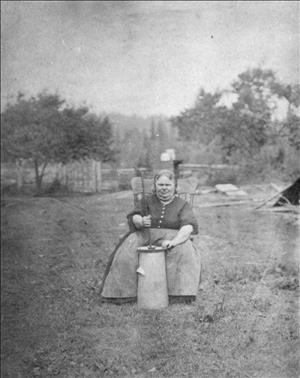Lucinda Collins Fares, later Lucinda Gordon in her second marriage, was the first non-Native woman to settle in the Snoqualmie Valley. "Lucindy" embodied the hard-working, pioneer spirit and was known for her kind heart.
Pioneers
Lucinda was the daughter of Luther and Diana (Borst) Collins, and arrived in the future King County at the age of 13 or 14 as a member of the Collins party, King County's first white settlers. The Collins family had originally settled in the Nisqually Valley on southern Puget Sound in the 1840s, but in September 1851 moved to the Duwamish Valley, near the present location of Boeing Field.
Although she was never able to read or write, Lucinda did learn the complex Salish language spoken by regional tribes. Most pioneers only went so far as to learn Chinook, a common jargon used for simple communication. As a young girl, Lucinda put her knowledge of local Native Americans to good use when an armed confrontation appeared likely between Duwamish Indians and Henry Van Asselt, a neighboring settler. Lucinda met with the Indians and warned them that Van Asselt "had lead in his body." It was a Duwamish belief that a body with lead was invulnerable, and Van Asselt did indeed have buckshot in his arm from an earlier accident. When confronted with this information, the Indians backed down, and bloodshed was averted.
In the late 1850s, Lucinda married Joseph Fares (1837-1922) (pronounced "Ferris"), a former Hudson's Bay Company man. They moved to the Snoqualmie Valley, where Lucinda's uncle, Jeremiah Borst, had settled a few years earlier. The Fares property would later be known as Tollgate Farm, located on the western entrance to North Bend. The Fares family operated a farm, using Fort Smalley (an abandoned blockhouse from the Indian Wars) as a barn. The farm had about 30 dairy cattle, and many stories are told about Lucindy's trained cows. Lucinda was a large woman, and found that moving her stool from cow to cow during milking time was too time-consuming. Instead, she trained each cow to respond to its own name, and they came to her when called. Lucindy milked each cow, in order, on her stationary milking stool.
A Center of Social Life
A few years after settling in the valley, Lucinda and her husband divorced, but she stayed on to run the farm. For years, her house was a cheerful stopping place for travelers going over Snoqualmie Pass. Once, while passing through, a man and his wife abandoned their son, and Lucinda ended up adopting him. She later married John Gordon and they continued living in the valley until the 1880s, when she returned to her family homestead on the Duwamish after the death of her brother. While there, she got a sliver in her toe, which became infected. Eventually, after enduring three separate amputations, Lucinda Collins Fares died.
She was buried in the old Denny Hill cemetery, now the site of Denny Park, in Seattle. Years later, during the Denny Hill regrade, bodies in the cemetery were disinterred for burial elsewhere. At the time, it was discovered that Lucinda's body had petrified and weighed close to 600 pounds. She now rests in Lake View Cemetery on Capitol Hill in Seattle.

